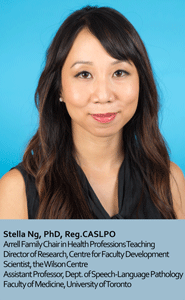Teaching and Assessing Critical Reflection: What, Why, and How?
Dr. Stella Ng

Date: Wednesday, May 15, 2019
Time: 12:00pm to 1:30pm (feel free to bring a bagged lunch)
Locations:
- DHCC 2267 (host venue)
- IRC 305
- RJH CA 120
- NHSC 9-374
Remote:
- Additional locations are available. Please email ches.communications@ubc.ca to request an additional site.
Abstract
While reflection, reflective practice, and critical reflection have been popular in the professions for decades, their use has been contested from the perspectives of both theoretical congruence and practical outcomes. I will share a program of research: 1) theoretically distinguishing reflective practice from critical reflection, 2) identifying the usefulness of critical reflection to practitioners, and 3) testing the practical outcomes of theoretically-aligned approaches to teaching and assessing critical reflection. I will show that reflective practice and critical reflection have related but distinct meanings, that critical reflection supports competent social practice, and share early findings from a randomized controlled trial comparing the effects of a critical reflection dialogue to a Social Determinants of Health discussion, using a theory-informed content analysis of what learners notice and how they talk during a simulation of homecare practice, as outcome measure. We will discuss implications for educational practice and future research.
Biography
When there is no clear-cut answer to be found, how can health professionals provide good care? Dr. Stella Ng was motivated by her clinical experiences, as a pediatric audiologist, to study how health professionals learn to practice well in response to the complexities of people’s lives, the health system, and society. Stella uses interdisciplinary theories of epistemologies of practice, reflection, critical reflection, and reflexivity to explicate what health professionals do in value-conflicted, uncertain, and unstable zones of practice. Informed by this research, Stella now studies and advances critical pedagogy and knowledge mobilization approaches to support the development of compassionate, ethical, and reflective practitioners who can attend to the social dimensions of care.
Accreditation:
The University of British Columbia Division of Continuing Professional Development (UBC CPD) is fully accredited by the Committee on Accreditation of Continuing Medical Education (CACME) to provide study credits for continuing medical education for physicians. This event is an Accredited Group Learning Activity (Section 1) as defined by the Maintenance of Certification Program of the Royal College of Physicians and Surgeons of Canada, and approved by UBC CPD. You may claim a maximum of 1.5 (x 10 sessions) hours (credits are automatically calculated). This Group Learning program meets the certification criteria of the College of Family Physicians of Canada and has been certified by UBC CPD for up to 1.5 (x 10 sessions) Mainpro+ credits. Each physician should claim only those credits he/she actually spent in the activity.
